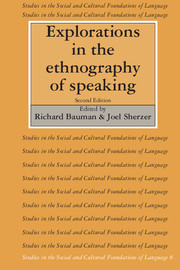Book contents
- Frontmatter
- Contents
- INTRODUCTION TO THE SECOND EDITION
- I PREFACE AND INTRODUCTION
- II COMMUNITIES AND RESOURCES FOR PERFORMANCE
- III COMMUNITY GROUND RULES FOR PERFORMANCE
- IV SPEECH ACTS, EVENTS, AND SITUATIONS
- Introduction
- 8 Strategies of Status Manipulation in the Wolof Greeting
- 9 Rituals of Encounter among the Maori: Sociolinguistic Study of a Scene
- 10 Speaking of Speaking: Tenejapa Tzeltal Metalinguistics
- 11 Black Talking on the Streets
- 12 Namakke, Sunmakke, Kormakke: Three Types of Cuna Speech Event
- 13 The Concept and Varieties of Narrative Performance in East European Jewish Culture
- V THE SHAPING OF ARTISTIC STRUCTURES IN PERFORMANCE
- VI TOWARD AN ETHNOLOGY OF SPEAKING
- Notes
- References
- Index of names
13 - The Concept and Varieties of Narrative Performance in East European Jewish Culture
Published online by Cambridge University Press: 05 June 2012
- Frontmatter
- Contents
- INTRODUCTION TO THE SECOND EDITION
- I PREFACE AND INTRODUCTION
- II COMMUNITIES AND RESOURCES FOR PERFORMANCE
- III COMMUNITY GROUND RULES FOR PERFORMANCE
- IV SPEECH ACTS, EVENTS, AND SITUATIONS
- Introduction
- 8 Strategies of Status Manipulation in the Wolof Greeting
- 9 Rituals of Encounter among the Maori: Sociolinguistic Study of a Scene
- 10 Speaking of Speaking: Tenejapa Tzeltal Metalinguistics
- 11 Black Talking on the Streets
- 12 Namakke, Sunmakke, Kormakke: Three Types of Cuna Speech Event
- 13 The Concept and Varieties of Narrative Performance in East European Jewish Culture
- V THE SHAPING OF ARTISTIC STRUCTURES IN PERFORMANCE
- VI TOWARD AN ETHNOLOGY OF SPEAKING
- Notes
- References
- Index of names
Summary
Oyf a mayse fregt men kayn kashe nit
(Yiddish proverb)Informants' statements, memoirs, previous studies, and collectors' comments in the introductions to their published materials show a remarkable consistency in their insistence that narration is a cultural focus in east European Jewish society (Gross 1955:10, 11; Olsvanger 1965:xxii–xxiii; B. Weinreich 1957:145, 151; Ravnitsky 1922:iii–iv; Schwarzbaum 1968:88; Holdes 1960:4–5; Bialostotski 1962:158). From the statements examined, the following emerges:
Stories are important and storytelling is frequent in this culture.
This has been the case from time immemorial. The Aggadah, the stories (and other non-legalistic materials) in the Talmudic-Midrashic literature, and the fame of ancient saints and sages as narrators are often cited as evidence of the antiquity of the Jewish penchant for narration.
Everyone can tell stories.
There are no professional storytellers who are hired for the sole purpose of telling stories.
Stories may be told at almost any time.
There are no ‘public performances’ for the sake of storytelling alone.
Jewish narrators are specialists in parables and jokes.
These notions are prevalent in both academic and non-academic circles and are accepted here as representing this society's own view of its narrational habits.
Yiddish terms are available for distinguishing types of storytelling acts (following Hymes' [1967] terminology): dertseyln a mayse (tell a story); zogn a vits (say a joke); gebn or brengen a moshl (present a parable), and other formulations.
- Type
- Chapter
- Information
- Explorations in the Ethnography of Speaking , pp. 283 - 308Publisher: Cambridge University PressPrint publication year: 1989

